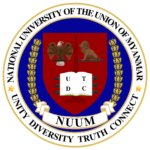Fellowship Programs
NUUM offers teaching and training opportunities for teachers and emerging leaders through fellowship programs and dynamic research and impactful service projects designed to produce knowledge and policy conversations on the pressing issues surrounding the political and socio-economic development inclusively for stakeholders in the process of building peace, democracy, and prosperity in the Southeast Asian Nation. More than 70 scholars, experts, and young professionals are participating in university administration, teaching, and research through administrative offices, courses under twelve certificate programs as well as CRPI Policy Action Capstone Courses.
FAQs For Teaching Fellows
1. What is the time commitment for Teaching Fellows?
2. What are the expectations of Teaching Fellows?
o Course title
o Learning objectives
o Textbooks or other materials
o Class schedule
o Teaching methods
o List of assignments and exams
- Fellows will participate in regular meetings with a team of fellows and instructors.
- Fellows will participate in all required training sessions.
3. What are the benefits for Teaching Fellows? What kinds of supports are available for Teaching Fellows?
- Fellows will gain experience and learn from mentors (instructors).
- Fellows will have the opportunity to network with other fellows, instructors and university leadership.
- Fellows will receive a small allowance to cover costs of internet service.
- For fellows based in Myanmar, a monthly stipend of 150,000 MMK/course will be provided.
- Fellows will have the opportunity to serve Myanmar.
4. Will Teaching Fellows be paid for their Fellowship?
5. What are the criteria for selection?
6. How and when will the classes meet?
Synchronous instruction (in which there is interaction between instructors and students in real time) is strongly encouraged. However, up to 50% of in-class time may be asynchronous (with no real time interaction between teachers and students), if appropriate. Asynchronous class time should be instructor controlled. Software to track activities of students during asynchronous class time (for example, to ensure their engagement with course materials) will be provided.
7. What course materials will be used?
- Find public access materials that can be freely accessed
- Put together a course reader
- Get permission from the publisher for use of a textbook or other materials
- In special cases, request that BACI pay for textbooks or other materials.
8. How will students be graded?
FAQs For University Leadership Fellows
1. What is the time commitment for University Leadership Fellows?
2. What are the criteria for selection?
- Fluent in English
- At least Bachelor’s degree or equivalent experience. Candidates with Master’s doctoral degrees in Educational Management are highly encouraged to apply.
- Interested in and passionate about higher education administration - Demonstrated commitment to the University’s values
- Candidates of any nationality will be considered, but candidates in Myanmar and the Myanmar diaspora will be given preference
3. What are the expectations of University Leadership Fellows?
- Fellows will participate in regular meetings with a team of fellows and administrators.
- Fellows will participate in all required training sessions.
4. What are the expectations of University Leadership Fellows?
- Fellows will participate in regular meetings with a team of fellows and administrators.
- Fellows will participate in all required training sessions.
Fellows are accepted both Cohort and Rolling basis.
Interested candidates should submit a resume or CV and a
one-page cover letter to Human Resources, NUUM at HR@UMyanmar.org. Applications will be
reviewed immediately.
Use of “nicknames”
In recognition of the poor security situation in Myanmar, instructors and students shall have the right to withhold their true identity during the course of the educational program. Their true identity shall be used in applying to UUM and the university administration shall have access to it, but “nicknames” can be used in interactions between students and instructors. The true identity of students and instructors will only be released to third parties when there is real need and with their permission. In registering with UUM, all instructors and students shall be given the opportunity to provide “nicknames” by which they will know over the course of the educational program. Such nicknames will be used for usernames, in place of real names.
Privacy
BACI and NUUM shall follow the requirements of the U.S. 1974 Family Educational Rights and Privacy Act, even when the Act does not legally apply. All records of BACI and NUUM shall be treated in such a manner as to ensure strict confidentiality as described in the confidentiality agreement.
Online security
Because of the vulnerability of email to hacking, all instructors, administrators, and students should refrain from including any highly sensitive content in emails. BACI will contract a consultant to identify additional measures to improve online security.
